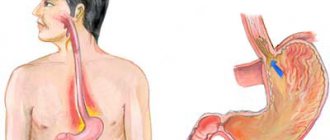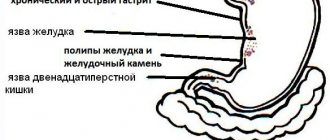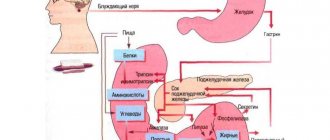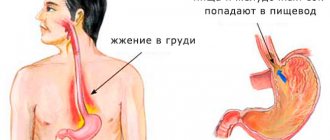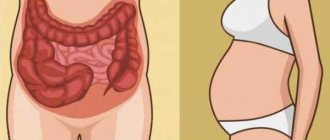Sour belching, especially accompanied by heartburn, is very common and in the vast majority is a symptom of pathological processes occurring in the body. Similar manifestations occur when the natural environment in the organs of the digestive system changes. Often, unpleasant symptoms go unattended due to the fact that a person is unaware of the true causes of such a disorder. The appearance of sour belching does not always signal serious pathological processes, but if it tends to recur, it is better to find out what provokes it.
Causes
The sudden appearance of belching also occurs in people with no diseases of the digestive system, usually as a result of quickly swallowing poorly chewed food, especially during a conversation, when air is swallowed along with food, as well as when drinking drinks with gas. But this is a natural phenomenon and should not cause concern. The only thing that can be alarming is when belching is accompanied by a sour taste that is felt in the mouth for a long time.
The reasons for this condition may be the following:
- Poor nutrition. A similar manifestation can be caused by eating large quantities of food harmful to digestion in the form of spicy, fried, fatty foods. Dietary irregularities with long breaks between meals and large meals at night can also lead to the appearance of such symptoms.
- Abuse of carbonated drinks.
- Repeated emotional shocks and stress increase the secretory functions of the stomach, which often causes sour belching and heartburn.
- Bad habits such as smoking and alcohol have an adverse effect on the stomach; morning smoking on an empty stomach is especially harmful to the digestive system.
- Physical labor, which begins immediately after eating. Belching occurs more often if you have to work in an inclined position.
- Pregnancy period. At this time, heartburn and belching occur as a result of compression of the stomach by the enlarging uterus. Such symptoms begin to bother a woman from the fifteenth week.
- Pathological conditions of the body. Most often, the cause of belching is a diaphragmatic hernia of the esophagus; belching is one of the main symptoms of this pathological condition.
- The period of exacerbation of a stomach or intestinal ulcer.
- Damage to the gastric mucosa in the chronic stage, accompanied by secretion disorders.
In order to identify the true causes of belching with a sour taste, it is necessary to differentiate the pathological condition of the gastrointestinal tract from diseases of other organs. Due to the fact that such manifestations can be caused by cardiac pathologies, as well as diseases of the pancreas, gallbladder and other organs, accurate diagnosis is the key to successful treatment.
If belching is caused by poor nutrition, then you need to reconsider your diet and adjust your eating behavior. All these reasons are easily eliminated and do not require significant effort or expense. It is much worse if the causes of sour belching are various pathological conditions. You should think about possible problems in the state of the body in the following cases:
- Acute and chronic forms of gastritis, in the presence of which there is an increased secretion of hydrochloric acid. When food enters the stomach, the mucous membrane, being in an inflamed state, begins to increase the production of acid, it becomes much more than is required for the digestion process. This condition is accompanied by heartburn, sour belching, nausea and even bouts of vomiting.
- Pancreatitis in acute or chronic form. Inflammation in the pancreas is accompanied by a disruption of its functions, which include the secretion of enzymes. These changes in her condition are caused by insufficient digestion of food and its stagnation in the intestines. The gases released during this process accumulate and come out in the form of belching.
- Gastroesophageal reflux disease. It manifests itself in a weakening of the esophageal sphincter, which causes the release of acid contents towards the esophagus.
- A hernia in the esophageal opening of the diaphragm can lead to increased intra-abdominal pressure and the release of acidic air in the form of belching.
- Neoplasms of benign and malignant nature, most often these pathologies begin with sour belching.
All gastrointestinal diseases with sour belching are usually accompanied by other signs characterizing the development of pathological processes. This may include constipation, diarrhea, abdominal pain, attacks of nausea and vomiting. When such symptoms appear, you should first of all find out their exact cause, for which you should undergo a diagnostic study by a gastroenterologist.
Causes of belching food
The causes of regurgitation associated with organic and functional pathologies of the gastrointestinal tract relate to the functioning of the esophagus, stomach and intestines. More likely causes of food belching are associated with diseases of the upper gastrointestinal tract. The food mass contained in them is at the initial stage of a long journey through the digestive system and is more susceptible to the effects of convulsive antiperistaltic movements of the muscle walls. But in most cases, the causes of regurgitation are combined.
"Esophageal" causes
Peristalsis of the esophagus (its ability to transport food) is a complex process controlled by the autonomic nervous system. Each portion of food moves towards the stomach through peristaltic esophageal waves. In addition to the muscle contractions associated with the act of swallowing, unrelated peristaltic waves reflexively arise, clearing the esophageal tube of foreign bodies and food debris.
Sometimes the causes of regurgitation and antiperistalsis of the esophagus are rhythm disturbances or the mutual overlap of both types of such waves.
Any obstruction of the esophagus provokes regurgitation, for example:
- deformation of the esophagus due to mechanical compression by large tumors;
- persistent spasm of the LES, preventing the passage of food (achalasia);
- narrowing of the esophagus of varying severity (stenosis);
- esophagitis of any etiology;
- presence of diverticula.
The expansion and stretching of the wall of the esophagus leads to a hernial protrusion of its part - a diverticulum - and a dangerous thinning of the muscle layer. Often it is completely absent, and the diverticulum is formed exclusively by mucous tissue.
The formation of such pouches most often occurs on the posterior esophageal wall due to injury or due to the entry of a foreign body (for example, due to inept probing). Inflammation of the diverticulum leads to regurgitation of food retained in the protruding part of the esophagus and pain. This phenomenon is called esophageal vomiting.
"Stomach" reasons
Mechanical obstacles to the movement of food into the duodenum can be scar formations, tumors of the pylorus (or pylorus, the outlet valve of the stomach) and its persistent spasm caused by the increased acidity of the stomach contents.
The release of food from the stomach into the oral cavity against the background of pyloric spasm is facilitated by:
- reverse protrusion (retrograde prolapse) of part of the stomach through the opening of the diaphragm into the chest against the background of increased pressure inside the peritoneum (the so-called hiatal hernia - HH);
- prolapse of the stomach of any etiology;
- gastritis or ulcerative lesions of the gastric mucosa, especially in its lower (pyloric) part;
- Characteristic of low acidity is an excessive amount of gastric mucus, which makes it difficult to retain food mass.
Reflex opening of the cardia is a consequence of alkalization of gastric juice. The cause of this phenomenon may be a pathological decrease in acidity (for example, in chronic atrophic gastritis).
"Intestinal" reasons
Antiperistaltic movements that cause reverse movement of food, episodic regurgitation and real vomiting, in some cases even with feces, can provoke intestinal obstruction.
The nature of intestinal obstruction - ileus - is twofold. The so-called mechanical obstruction occurs as a result of compression or volvulus of intestinal loops (introduction of a section of intestine into the lumen of an adjacent section). It is accompanied by impaired circulation and subsequent necrosis of the intestinal area.
The cause of dynamic obstruction is a prolonged spasm of the intestinal muscles, and in some cases even its complete paralysis, caused by neuromuscular pathologies.
Note! Intestinal obstruction of any etiology is an emergency!
Reflux disease
Regurgitation is the active release of undigested food from the stomach that reaches the oral cavity. It is often confused with reflux - the passive leakage of gastric contents due to changes in body position, excess pressure in the peritoneum, or physical activity that changes the geometry of the abdominal cavity.
Gastroesophageal reflux disease (GERD) and regurgitation have a common cause - weakness of the cardia; they can also be united by a common symptom in the form of nocturnal heartburn and excruciating chest pain.
To some extent, GERD can be called a harbinger and a special case of regurgitation, when a liquid portion of food - reflux - does not always reach the oral cavity. The consequences of GERD are dangerous changes in the tissues of the cardia and the lower third of the esophagus: dense scars form there (when muscle fibers are replaced by rough connective tissue), ulcerations, and areas of metaplasia. These changes, sometimes becoming irreversible, reduce the elasticity of the esophageal walls and create the preconditions for the progression of motor disorders, the most striking symptom of which is belching food.
Neuromuscular disorders
Numerous physiological observations confirm the clear dependence of motility disorders of the gastrointestinal tract on innervation. Lesions of the human central nervous system (CNS) in the form of disturbances in the transmission of nerve impulses not only disrupt the coordination of the activities of various parts of the gastrointestinal tract, but also the work of any of its organs.
In particular, relaxation of the cardiac sphincter, up to its complete insufficiency, is sometimes a consequence of a decrease in the irritability of the vagus nerve entwining the esophagus and stomach (when, to strengthen the cardiac sphincter, a stronger than before nerve stimulus emanating from the autonomic centers of the brain is required).
Sour belching after eating
To determine the causes of sour belching that appears after eating, it is important to find out when it occurs and with what intensity, what precedes this condition - an inflammatory process in the gastrointestinal tract or food harmful to the stomach. Most often, this is evidence of a lack of enzymes necessary for digestion, as a result of which food remains in the stomach longer than it should, and fermentation processes occur in it with the formation of gas. Gas, as it accumulates, begins to put pressure on the inlet valve of the esophagus. At the same time as the gas, particles of undigested food with hydrochloric acid penetrate into the esophagus, resulting in sour belching.
When belching occurs after eating, then most likely there are problems with the gallbladder or bile ducts. Such a common disease as chronic gastritis, characterized by high acidity, in most cases is accompanied by the appearance of belching with a sour taste.
In the presence of these pathological conditions, the digestive processes are usually disrupted, in which too much gas is formed in the stomach and intestines, and the muscular ring of sphincters that separates the stomach from the intestines and esophagus is weakened. Motility in the intestines in such conditions is also always impaired; as a result of these changes, gas escapes into the esophagus, which causes belching.
Its appearance is especially common during aerophagia, when air is swallowed while eating. The period of its occurrence is unstable; belching can occur both immediately after eating and some time after. In the case of serious pathologies, such as stomach cancer, peptic ulcers, neuroses or mental exacerbations, belching often occurs at rest.
Frequent belching of air
If a person is tormented by frequent belching that occurs throughout the day, this means that there is a malfunction in the digestive system. What can cause burping of air:
- nervous shocks;
- chronic pharyngitis;
- unhealthy diet, overeating;
- diseases of the digestive system;
- diseases of the cardiovascular system.
Belching of odorless air appears if you talk a lot when you eat, chew food poorly and swallow large pieces of food, since this pathology is often caused by increased gas formation in the stomach. It is also important to combine batteries correctly.
Frequent belching and its causes do not always appear due to poor nutrition; quite often these symptoms also indicate the development of nervous pathologies.
Causes of pathology:
- if a person has difficulty breathing through his nose;
- dental diseases;
- profuse salivation.
Clinical picture of this pathology:
- Belching is constant or frequent in hysterical people. It is often accompanied by sobbing.
- The disease disappears during sleep, but appears after eating and can bother the patient during the day.
- Complaints of distension and heaviness of the abdomen, which appears most often in the area under the stomach.
Interesting! Belching with bitterness - causes and treatment, associated symptoms
When examined by a doctor, air may come out of the patient's mouth; this will disappear if the patient is distracted. At this moment, the doctor observes how the patient swallows air, stretching his neck forward: at this moment, the chin is pressed to the chest, and the patient begins to swallow air. With aerophagia, a person has noticeable bloating in the upper abdomen, and with the help of an x-ray, a high condition of the diaphragm can be seen.
Additional Information! Often this disease can be found in newborns or infants. Their nervous system cannot yet deal with digestive processes.
The reasons for the accumulation of a large amount of air in the abdomen are a small breast or an empty nipple: at the moment of sucking, the child swallows excess air, which then burps.
When there is a problem in the digestive system, several symptoms may appear. Usually this is the release of gases and nausea, they appear:
- in case of food poisoning;
- if you chew food quickly but poorly;
- in a nervous state;
- for diseases of the digestive system.
If a person has an acute form of digestive system disease, other symptoms may be added to belching and nausea:
- flatulence;
- heartburn;
- increased body temperature;
- lack of appetite;
- problems with stool.
Sour belching accompanied by heartburn
Sour belching with heartburn can be caused by a variety of reasons, such as:
- the reason may be medications taken to suppress inflammatory processes;
- changes in hormonal levels;
- bad habits;
- advanced stage of chronic diseases;
- insufficient physical activity.
When belching occurs after eating and does not last long, gradually fading, there is no cause for alarm. But when it occurs for no apparent reason, lasts a long time, and in addition is accompanied by painful heartburn, then this is often a sign of a malfunction of some organ, most likely the stomach.
In such situations, it is important to find out the causes of this condition:
- lack of muscle tone in the walls of the stomach;
- pathological conditions of the heart and blood vessels, characterized by severe course;
- inflammation developing in the gastrointestinal tract;
- damage to the nervous system;
- problematic conditions in the respiratory system;
- pathologies of the endocrine system.
A fairly extensive list of diseases can cause belching and heartburn, most often it can be:
- stomach or intestinal ulcer;
- chronic or acute form of pancreatitis;
- liver diseases;
- poisoning and cholecystitis;
- diabetes;
- hiatal hernia;
- tumor formations.
Many foods eaten in large quantities can lead to heartburn and belching. First of all, these are legumes, radishes, eggs, grapes, baked goods and various pastries, apples, mushrooms, alcohol, especially those containing gas, fried foods, cheese.
The situation becomes more complicated when heartburn and sour belching are complemented by attacks of nausea, most often this serves as irrefutable evidence of a disorder in the digestive system. It is impossible to identify the causes of such changes in the body’s condition on your own; accurate diagnosis can only be carried out in a hospital.
Belching with acid reflux
Belching is the release of digestive gas through the mouth. This is often an unconscious action that occurs several times a day. Most gas is air that has been swallowed while eating, drinking and talking. Although burping is considered normal, excessive burping can be a sign of various medical conditions. However, in the vast majority of cases, this occurs when excessive amounts of air are swallowed, such as when eating fast, chewing gum, etc.
Acid reflux is the backflow of acidic stomach contents . This includes foods or drinks that have recently been consumed, along with stomach acid and strong digestive enzymes that are produced by glands in the stomach wall. It occurs when the lower esophageal sphincter (LES) normally prevents backflow problems. It is also caused by increased abdominal pressure and, to some extent, position.
Belching or burping is the release of digestive gas through the mouth.
Gastroesophageal reflux disease (GERD), which is a term used interchangeably with acid reflux, is a more severe form that is often chronic and affects a person in many ways beyond reflux symptoms. Belching is one of the symptoms of reflux, along with other symptoms such as heartburn (burning pain in the chest), nausea, indigestion and regurgitation. The expulsion of digestive gas can also carry acid higher into the esophagus, causing symptoms that can be called acid burps, where there is a burning pain in the chest with belching, a sour sour taste in the mouth with belching, and a burning pain in the throat and mouth. The burning sensation and sour taste are caused by acid in the esophagus, throat and mouth.
Bitter - sour belching
The appearance of bitterness simultaneously with belching is observed quite often. This happens due to a small amount of bile entering the throat as a result of reflux. Due to the fact that two refluxes can occur in the stomach, at the entrance to the stomach cavity in the form of gastroesophageal reflux and at the exit from it into the intestines, the so-called duodenogastric reflux, then food that is not yet sufficiently digested can enter the intestines and linger there. The increase in pressure in the intestines from accumulated gas makes it difficult for food to move through it, and also prevents it from entering the intestines from the stomach.
The exact opposite can also happen; increased pressure in the intestines pushes its contents back into the stomach. This is also facilitated by the occurrence of abnormal peristalsis of the intestines and stomach walls, when the muscles begin to work in the opposite direction. During these processes, the food does not have time to be sufficiently digested, and its improper movement forms an increased amount of gas, which comes out as belches with a bitter aftertaste. Often with gas, a small amount of contents from the stomach and even from the intestines reaches the pharynx under great pressure. In this case, belching is accompanied by a bitter or sour taste. If the taste is bitter, this means that a small amount of bile with intestinal contents has entered the esophagus.
Aspects of proper nutrition
To prevent regurgitation, you should follow the basic rules “at the table”:
- It is not recommended to eat food under nervous tension;
- chew food thoroughly and slowly;
- after eating, do not perform heavy physical activity for two hours;
- Avoid foods that increase gas formation in the abdomen, painful bloating and belching.
If air comes out of the mouth with a specific odor and pain is felt throughout the abdomen, then you should urgently consult a doctor, since such symptoms may indicate serious diseases that require diagnostic examination and urgent treatment.
Constant belching
Each person, regardless of whether he suffers from any gastrointestinal diseases or is absolutely healthy, contains a certain amount of gas in his stomach, the amount of which is individual and largely depends on the person’s age, lifestyle, physical activity, dietary preferences, as well as from possible changes occurring under the influence of life processes. Constantly present belching can also be caused by a variety of reasons, such as:
- Aerophagia, which refers to the process of swallowing air with food. This can be observed with rapid absorption of food, conversation while eating, a tendency to overeat, abuse of carbonated drinks and smoking. The air that enters the stomach during these actions is removed from the body through belching.
- Constant belching also occurs when performing active physical actions that are taken immediately after eating.
- A similar reaction of the body occurs as a result of disturbances in peristalsis of the upper gastrointestinal tract.
- An incorrectly formulated diet, when a large number of foods that contribute to gas formation are consumed.
- The occurrence of gastroesophageal reflux.
- Development of peptic ulcer of the stomach and intestines.
- Pregnancy in the last trimester due to compression of the stomach by the enlarging uterus.
- Large portions of food.
- Development of gastric stenosis.
- Mental disorders.
- Having excess weight, in which fat deposits can compress the walls of the stomach.
- Disturbances in the processes of enzyme secretion, in any direction.
Belching is a natural process in the life of the body; if it were not there, then how the body should get rid of the gases that are released in the stomach and intestines during the metabolic processes occurring there is unclear. You should be wary of the increased occurrence of belching or its persistence, since this is a well-founded sign of a wide range of diseases.
Causes of regurgitation
On an empty stomach, any healthy person experiences a small amount of air. It is swallowed together with food and drink. When eating food, gas rises upward, and when the pressure in the stomach is quite strong, the sphincter that closes the organ does not compress completely, which leads to the release of air.
A healthy person belches air due to:
- overeating;
- drinking beer, soda;
- wearing tight clothes, belts;
- use of chewing gum;
- eating foods that cause increased gas formation (cabbage, legumes, onions);
- quick snacks, not thoroughly chewed food;
- pregnancy;
- using an inhaler;
- active exercise immediately after eating;
- increased body weight.
A one-time belching of air, smelling of eaten food, is a completely natural physiological process. So the stomach tries to free itself from the increased pressure that has appeared.
Treatment options
The manifestation of belching with acid is considered to be pathological symptoms that serve as evidence of diseases affecting the digestive organs. It may be accompanied by pain or heartburn, but can also occur on its own. In order to make a correct diagnosis based on which prescriptions will be made, it is necessary first of all to determine the factor that provokes this condition. If this happens after eating and immediately, this may indicate a dysfunction of the valve that closes the passage from the stomach to the esophagus.
In the case of belching with a sour taste, which occurs no earlier than half an hour after eating, this is an indicator of enzyme deficiency, as a result of which the food is poorly digested and undergoes fermentation with the formation of gases. The popular name for this condition is indigestion, which can and should be treated, but only as prescribed by a gastroenterologist.
Treatment of the condition of the body when sour belching and other corresponding manifestations occur should only be carried out by a doctor. It is impossible to eliminate this problem on your own, as the situation may worsen even further and require drastic treatment methods.
For frequently disturbing belching, the doctor may prescribe medications in the form of Festal or Mezim, as well as antacid medications designed to reduce the acidity of gastric juice.
Diagnosis of food belching
To make an accurate diagnosis, the doctor prescribes the patient to undergo the necessary diagnostic examination. First of all, the doctor studies information about the disease, the patient’s living conditions and what ailments he suffered. Next, he asks the patient about the nature and duration of symptoms, the time interval for the appearance of belching after a meal. To make a diagnosis, the doctor must confirm or refute the presence of various gastric ailments using laboratory tests. The patient must undergo a blood test, stool test for the presence of blood and biochemistry. It will be important to carry out a coprogram, ultrasound, colonoscopy, FGDS to identify or refute the presence of Helicobacter pylori in the body.
Folk remedies and methods
You should not hope that with the help of folk remedies you will be able to completely get rid of belching, however, it is quite possible to alleviate the condition and improve the functioning of the stomach with their help. When using medicinal products based on medicinal plants, under no circumstances should you stop taking medications prescribed by a gastroenterologist. Following a diet and using traditional medicine recipes can increase the effectiveness of the treatment.
To eliminate increased stomach acidity, which most often results in heartburn and sour belching, as well as to improve the general condition of the body, the following remedies are used:
- flaxseed, an infusion of it is prepared from 1 teaspoon of seed per glass of boiling water, infused for 3 hours and drunk in the morning before breakfast;
- chamomile, which is brewed as tea from 2 tablespoons. spoons of raw materials per 300 ml of boiling water, drink 0.5 cups 3 times a day;
- anise and fennel, a mixture of 2 teaspoons, infused in a glass of boiling water, drink a tablespoon 4 times a day;
- oats, 1 table. Steam a spoonful of grains, preferably unrefined, in 350 g of boiling water in a thermos, strain and take 2 tablespoons. spoons before meals and at night.
Various substances and plants, as well as vegetable juices and much more, can be used as medicinal products. But since the digestive system is very vulnerable at the time of inflammation, any treatment aimed at eliminating disturbances in its condition must be carried out only with the approval of a doctor.
Treatment methods
Sour belching requires special treatment only if it recurs regularly, is accompanied by painful sensations, or simply causes psychological discomfort in the patient. The treatment strategy is determined by the attending physician after performing the necessary diagnostic procedures .
Video: combating high stomach acidity
Drug therapy
Antacids and antisecretory drugs can be used to combat increased gastric acidity. Agents from the first group (Almagel, Maalox, Rennie) neutralize the acid by direct interaction with it, forming easily excreted salts and water. Antisecretory drugs (Omeprazole, Pantoprazole, Ranitidine) interfere with the production of acid by the walls of the stomach.
The peristaltic activity of the digestive tract is increased by prokinetics (Ganaton, Domperidone, Itomed, Motilium). Enzyme preparations (Mezim, Pancreatin) are used for low pancreatic functionality. In case of excessive proliferation of pathogenic bacteria, antibiotics are used (Azithromycin, Amoxiclav, Klacid).
Surgical treatment
Surgery is used in extremely severe cases that cannot be corrected with medication. Such situations include:
- Significant weakening of the esophageal opening of the diaphragm;
- Numerous adhesions and ulcers;
- Tumor process;
- Complete obstruction of the stomach and duodenum;
- Displacement of organs inside the abdominal cavity.
Diet
Diet correction is the most common and effective method of combating sour belching . The main principle should be fractional, orderly meals. It is advisable to delay the last meal and bedtime by at least 2–4 hours. Half an hour before meals, you need to drink up to 1 glass of warm water to activate the process of peristalsis. Light porridges (oatmeal, pumpkin) and jelly have a beneficial effect on the digestion process.
It is necessary to avoid foods that irritate the walls of the stomach:
- Alcohol;
- Mutton;
- Sparkling water;
- Mushrooms;
- Excessively hot and cold food;
- Cocoa and chocolate;
- Pickled vegetables;
- Smoked meats;
- Coffee;
- Marinades;
- Korean style carrots;
- Pearl barley porridge;
- Sweets;
- Sour cream;
- Sauces;
- Tomatoes;
- Fast food;
- Citrus.
Gallery: foods prohibited for sour burps
Ethyl alcohol strongly irritates the stomach walls
Coarse cereals are contraindicated for heartburn
Astringents in cocoa beans may reduce stomach and intestinal activity
Caffeine increases gastric acidity
Nutrients contained in mushrooms are difficult to extract
Lamb is too heavy for a weak stomach
“Fast” food creates extra stress on the stomach and duodenum
Sugar slows down digestion and promotes fermentation
Fermented foods contain too many organic acids
Smoked meat is hard on the digestive system
Sauces contain a lot of hot spices
Cold irritates the nerve endings of the esophagus and stomach
Excess acids in citrus fruits can irritate the stomach wall
Folk remedies
Traditional medicine has discovered numerous means to improve the functioning of the gastrointestinal tract, reduce acidity, and reduce the inflammatory process at the initial stage. Using these methods allows you to successfully combat sour belching. However, it should be remembered that many herbal remedies by nature have high biological activity, and therefore can cause harm if used carelessly.
Table: folk remedies against sour belching and heartburn
| Product name | Composition and method of preparation | Reception mode |
| Walnuts | Crush the peeled fruits. | Take 1 tbsp. l. every day. Used for preventive purposes. |
| Potato juice | Add 1 tbsp to freshly squeezed potato juice (1 glass). l. honey. Stir. | Drink half a glass in the morning and evening. |
| Calamus root | Grind dry calamus root into powder. | The powder, which fits on the tip of a teaspoon, is washed down with plenty of warm water. Used to treat heartburn |
| Celery root | Grind the fresh root. | Consume with water, 1 tbsp. l. three times a day, 30 minutes before meals. |
| Angelica infusion | 1 tsp. Pour a glass of boiling water over the crushed root, leave for half an hour, filter. | Drink a glass of the product in small portions throughout the day. |
| Baking soda | 1 tsp. Stir baking soda in a glass of warm water. | Drink the solution if you have severe acid reflux or heartburn. |
| Infusion of wormwood | 1 tbsp. l. pour a glass of boiling water over the herbs, leave for 2 hours, filter. | Take half a glass once a day, half an hour before meals. Considering that wormwood alkaloids have a toxic effect, this remedy should be used with great caution. |
Prevention
To prevent the occurrence of such an unpleasant phenomenon as belching, especially with sour tastes, it is important to adhere to proper nutrition. To this end, you must follow some rules:
- do not eat spicy foods or fried foods;
- categorically give up alcohol and smoking;
- eat small portions, avoid overeating;
- avoid snacking on the run, especially fast food products;
- try not to irritate the stomach with coarse or difficult-to-digest foods.
Sour belching can be a signal of serious pathological processes developing in the digestive organs. Therefore, it is especially important when this unpleasant symptom appears to find out the cause of this condition, by eliminating which you can get rid of the disease.
Treatment of acid belching
Treatment for acid burping is much the same as treatment for GERD, but with additional measures to relieve excessive burping.
- Antacids are one of the most widely used medications as they are readily available over the counter (OTC). It works by neutralizing stomach acid, but the effect is usually short-lived.
- Acid-suppressing drugs, such as proton pump inhibitors and H2 antagonists, block the production of stomach acid. This is the preferred option for sustained relief over several hours.
- Raft barrier agents are another over-the-counter product that can sometimes be combined with antacids. It works by floating on top of stomach acid and acts as a barrier between stomach acid and the wall of the esophagus.
- Prokinetic drugs such as metoclopramide speed up gastric emptying. It is not usually used for acid reflux, but may be needed in cases of delayed gastric emptying.
- Antifoaming agents such as simethicone help reduce the buildup of digestive gas that can disrupt the functioning of the LES and push acid into the esophagus.
Although various medications can be used for acid burping, diet and lifestyle are equally important. It will include measures such as eating smaller meals more often, cutting out alcohol and caffeine, minimizing carbonated drinks, eating slowly and quitting tobacco.
Reviews
Dear readers, your opinion is very important to us - therefore, we will be glad to hear your feedback about sour burps in the comments, this will also be useful to other users of the site.
Galina Sergeevna
Those who have not encountered such a phenomenon as belching may not understand, but when it occurs during an important conversation, and even with the taste of acid, it is very unpleasant and ugly. Moreover, this can happen unexpectedly. Since I was young, I have had heartburn, but not constantly, but after certain foods, and recently I have also started to suffer from belching. I checked my stomach, nothing serious, but they found a slight gastritis. A diet helped to cope with the problem, which benefited the whole body, and the doctor prescribed Mezim. Now it almost never happens.
Elena
My son has had problems with his pancreas since he was four years old, when he was poisoned by boiled corn at the market. Now for 12 years, the disease worsens from time to time, and belching after every meal. I brew chamomile, it helps a lot.
Lera
If there is only one belch, it’s not so bad, but the process continues to develop even if you don’t pay attention to it. you can simply trigger the underlying disease.
Treatment
Depending on the provoking factors, treatment is prescribed for belching accompanied by gastric contents. If this physiological phenomenon is observed in an isolated case, then errors in food are to blame. But if regurgitation repeats throughout the day every few hours for one to two weeks, this indicates serious pathologies. If you observe constant belching of stomach contents, you should immediately consult a doctor. Therapy is carried out in combination with the use of a therapeutic diet, medications and traditional medicine.



